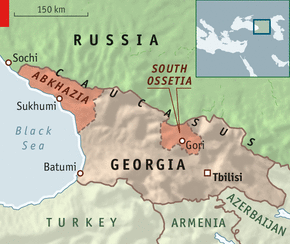GEORGIA'S FUTURE: NO CHANGE FOR THE BETTER
Georgia appears to have moved backwards under Bidzina Ivanishvili
Oct 12th 2013
| TBILISI |From the print edition


MIKHEIL SAAKASHVILI, Georgia’s outgoing president, can be accused of many things, but lack of vision is not one. Ten years ago the then 36-year-old Mr Saakashvili led the rose revolution to become the world’s youngest national leader. His country was a traumatised, failing state. Over the next ten years, he led it through a mental revolution, modernising it, shaking off its Soviet legacy and putting it back on the map. He also fought and lost a war with Russia, cracked down on the opposition, dominated the media, interfered with justice and monopolised power.“In our rush to impose a new reality, against the background of internal and external threats, we have cut corners and certainly made mistakes,” Mr Saakashvili said in his farewell speech at the United Nations. The price for those mistakes was the loss of last year’s parliamentary election to Georgian Dream, a coalition led by a reclusive 56-year-old billionaire, Bidzina Ivanishvili, who made his fortune in Russia. Many Georgians rejoiced that Mr Saakashvili’s monopoly on power was broken.
On October 27th Georgia will vote for a new president, whose powers will be curtailed by a new constitution turning the country from a presidential into a parliamentary republic. But instead of excitement and hope, the air in Tbilisi is thick with anxiety. The leading contender is Georgy Margvelashvili, a former education minister, whose most striking quality is a lack of political experience or ambition. Mr Ivanishvili chose him instead of Irakli Alasania, an able West-orientated defence minister, whom he slapped down for his presidential ambition. Next comes the candidate of Mr Saakashvili’s United National Movement (UNM), David Bakradze, a soft-spoken former speaker of the parliament, who has tried to project a sense of calm and whose poll rating is around 18%. Then there is Nino Burjanadze, a populist, who has been endorsed by Mr Ivanishvili as a viable opposition force. Once an ally of Mr Saakashvili, she has become his fiercest opponent. After her dealings with Moscow and violent clashes in Tbilisi, she was presumed politically dead. Many Georgians now worry about the past rearing its head. Her eye-catching campaign appeals to those who consider Mr Ivanishvili too soft on Mr Saakashvili. Although her rating is below 10%, she has said any result short of victory would be a sign of rigging. There could also be a second round and calls for a new parliamentary election.
Yet the main source of uncertainty is Mr Ivanishvili. Last month he shocked the country by saying he would step down as prime minister after the presidential election to concentrate on strengthening civil society. Members of Mr Ivanishvili’s coalition, including David Usupashvili, the thoughtful speaker of the parliament, seemed relieved. But Mr Saakashvili’s supporters are worried. “Mr Ivanishvili wants to stay in charge but not be accountable. The danger is that his departure will create a power vacuum that could result in chaos,” says Giga Bokeria, one UNM leader.
Georgian voters who hoped for a windfall from Mr Ivanishvili’s wealth feel cheated: some 70% say they disapprove of his early departure. Mr Ivanishvili came to power promising to respect the law and create jobs, but his main motive was to destroy Mr Saakashvili and his party machine, often through selective justice. Vano Merabishvili, a former interior minister, has been arrested and detained as his trial has been repeatedly postponed. Several local UNM mayors have also been dismissed or arrested on trumped-up charges.

In trying to destroy Mr Saakashvili’s legacy, Mr Ivanishvili has gutted the mechanism of governance, say critics. Little progress has been made on things that matter to Georgians, including jobs and territorial integrity. The economy is stalling, foreign direct investment is drying up and Russian soldiers are drawing new borders with barbed wire in villages in occupied South Ossetia. Political pressure on the media is rising. Two political talk shows have been taken off air. In a recent meeting with Georgian journalists, Mr Ivanishvili lashed out at their critical coverage. (Mr Ivanishvili and most of his ministers refused to be interviewed by The Economist.)
Most worrying, Mr Ivanishvili has stirred up some dark forces in Georgian society, including far-right nationalists and semi-criminal groups, who have recently staged ugly anti-gay riots, defending “traditional Orthodox values” against corrupting Western influences. Anti-Armenian and anti-Muslim rhetoric is on the rise. Convicted criminals have been let out of jail to roam the country.
“Everything we fought against is back. We were tired of the last government, but what we’ve got is certainly no better,” says Shorena Shaverdashvili, editor of Liberali, a political magazine. Many young, Western-influenced Georgians feel that their country is going backwards. Mr Ivanishvili’s attempt to present the past ten years as a failure is an insult to their hard work. A decade ago, many bright Georgian expatriates returned, full of optimism. Now, the same people are talking of leaving.
From the print edition: Europe